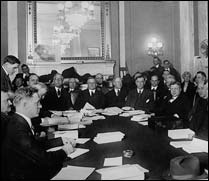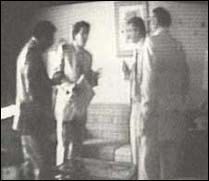History of Washington Scandals
The investigation into lobbyist Jack Abramoff and others is the latest in a
series of Washington corruption scandals that have rocked the nation's capital.
"My own judgment is that this could be the biggest [lobbying scandal] that we
have seen in our lifetimes," congressional scholar Norman Ornstein has said.
"This may involve a more institutional corruption scheme that could have great
resonance."
As in the past, revelations of indiscretions and possible corruption have
prompted political parties to unveil reform packages. The stories of influence
peddling and the calls for reform are part of an occasional cycle of corruption
scandals that have plagued Washington since the close of the Civil War.
Crédit Mobilier
Up until the late 19th century, the nation's capital was still a sleepy,
southern town where congressmen lived in boarding houses that doubled as remote
offices. With their families back in their home districts, and few cultural
outlets in the federal city, legislators often loitered in clubs and hotel
lobbies for social gatherings.
It was during this time that President Ulysses S. Grant coined the term
"lobbying" to refer to the representatives of corporate interest groups who
would mingle among lawmakers. But these cozy relationships soon led to scandal.
 In
1872, the New York Sun revealed that several influential congressmen were
involved in a government contracting scheme with a dummy railroad firm, Crédit
Mobilier. Thomas Durant, a vice president of the Union Pacific Railroad, created
Crédit Mobilier of America as a front for increasing its shareholders' profits.
In 1864, the company was given a no-bid contract to build a 667-mile stretch of
the Transcontinental Railroad, with much of the cost being paid for by federal
subsidies.
In
1872, the New York Sun revealed that several influential congressmen were
involved in a government contracting scheme with a dummy railroad firm, Crédit
Mobilier. Thomas Durant, a vice president of the Union Pacific Railroad, created
Crédit Mobilier of America as a front for increasing its shareholders' profits.
In 1864, the company was given a no-bid contract to build a 667-mile stretch of
the Transcontinental Railroad, with much of the cost being paid for by federal
subsidies.
All of this was thanks to the work of Massachusetts Republican Rep. Oakland
Ames. Ames had gained influence as a key member of the committee devoted to
laying down railroad track during the Civil War. In exchange for support of
giving contracts and subsidies to Crédit Mobilier, Ames sold shares to his
fellow congressmen at prices significantly below market value. When Crédit
Mobilier's profits skyrocketed during the railroad boom, executives and
congressmen alike reaped millions of dollars in profits. It is believed that
Crédit Mobilier received $47 million in contracts, turning $21 million in
profit.
When the Sun broke the story on the eve of the 1872 election, House Speaker
James Blaine, R-Maine, directed a committee of 13 congressmen to investigate the
matter. Based on their findings, the House of Representatives censured Ames and
Whig James Brooks of New York. Other implicated politicians included outgoing
Vice President Schuyler Colfax, incoming Vice President Henry Wilson, and
then-congressman and future President James Garfield.
In the wake of the Crédit Mobilier scandal, among other smaller
controversies, the House passed its first laws regulating lobbying. Under the
rules passed in 1876, lobbyists had to register with the clerk of the House.
Three years later, in order to prevent lobbyists from posing as journalists,
members of the press had to register as well.
Teapot Dome: Corruption in the executive
branch
Although Congress attempted to reform lobbying, the growing voice of people who
termed themselves "progressives" in the country demanded more and expressed deep
misgivings about those seeking to influence legislation.
"Washington has seldom seen so numerous, so industrious, or so insidious a
body [as lobbyists]," said President Woodrow Wilson in 1913.
Yet it was Wilson's successor, Warren Harding, who suffered from the next
major bribery scandal. The Teapot Dome scandal implicated Secretary of the
Interior Albert Fall and ruined the legacy of the short-lived Harding
presidency.
 Over
the course of previous administrations, the federal government established
emergency petroleum reserves in Elk Hills in California and Teapot Dome in
Wyoming for use by the Navy. In 1923, the Public Lands Committee of the Senate
began investigating the oil reserves and discovered both had been illegally
leased to oil tycoons by Fall.
Over
the course of previous administrations, the federal government established
emergency petroleum reserves in Elk Hills in California and Teapot Dome in
Wyoming for use by the Navy. In 1923, the Public Lands Committee of the Senate
began investigating the oil reserves and discovered both had been illegally
leased to oil tycoons by Fall.
Fall is believed to have received more than $300,000 in bribes, but refused
to answer questions before the Senate, claiming fear of self-incrimination. E.L.
Doheny of the Pan-American Oil Co. confessed before the committee that he had
given Fall a $100,000 "loan," among other gifts, for rights to the Elk Hills
reserves. Harry Sinclair of Sinclair (Mammoth) Oil was also implicated in the
scandal, but declined to cooperate, was charged with contempt and fined
$100,000.
Fall continued to fight prosecution until 1929, when he was also fined
$100,000 and spent a year in jail.
At the time, Democrats believed that they could take political advantage of
the scandal, but Doheny's testimony hurt them as well. A significant figure in
the Democratic Party in California, Doheny implicated several Wilson
administration officials in his appearance before Congress. Doheny also admitted
to paying the presumed presidential candidate for the 1924 election, William
McAdoo, payments totaling $250,000.
Abscam and the Keating Five
In 1978, the Federal Bureau of Investigation embarked on a sting operation,
labeled Abscam, in which agents posed as Middle Eastern businessmen offering
bribes to senators and congressmen. The FBI targeted 31 government officials in
total during the operation, including state officials in New Jersey and
Pennsylvania.
Six congressmen, Democrats John Jenrette of South Carolina, Raymond Lederer
of Pennsylvania, Michael Myers of Pennsylvania, John Murphy of New York and
Frank Thompson of New Jersey, and Republican Richard Kelly of Florida, and one
senator, Democrat Harrison Williams of New Jersey, were convicted of bribery and
conspiracy charges in 1981.
Democratic Rep. John Murtha of Pennsylvania also was indicted but not
prosecuted because he gave evidence against Murphy and Thompson. Only one
lawmaker, Republican Sen. Larry Pressler of South Dakota, refused to take the
bribe, saying at the time, "Wait a minute, what you are suggesting may be
illegal."
 Kelly
initially had the conviction overturned when a judge ruled the sting amounted to
illegal entrapment, but in 1984, a higher court sentenced Kelly to 13 months in
prison. Kelly was famously caught on videotape packing his pockets with $25,000
in cash, asking the undercover agents, "Does it show?"
Kelly
initially had the conviction overturned when a judge ruled the sting amounted to
illegal entrapment, but in 1984, a higher court sentenced Kelly to 13 months in
prison. Kelly was famously caught on videotape packing his pockets with $25,000
in cash, asking the undercover agents, "Does it show?"
But as opposed to Abscam tarnishing Congress, it was the FBI that dealt with
much of the long-term scrutiny as investigations into their probe brought up the
entrapment issue. After Abscam, there have been no published accounts of efforts
to catch lawmakers in the act, rather the focus became investigating wrongdoing
after the act.
The Keating Five scandal from 1989 implicated five senators in another
corruption probe. Democrats Dennis DeConcini of Arizona, Donald Riegle of
Michigan, John Glenn of Ohio and Alan Cranston of California, and Republican
John McCain of Arizona, were accused of strong-arming federal officials to back
off their investigation of Charles Keating, former chairman of the Lincoln
Savings and Loan association. In exchange, the senators reportedly received
close to $1.3 million in campaign contributions.
The Senate Ethics Committee concluded that Glenn and McCain's involvement in
the scheme was minimal and dropped the charges against them. In August 1991, the
committee ruled that the other three senators had acted improperly in
interfering with the Federal Home Loan Banking Board's investigation.
DeConcini and Riegle did not run for re-election in 1994 and were succeeded
by Republican Sens. John Kyl and Spencer Abraham.
House banking scandal
The more recent significant corruption scandals have centered on abuses of
power, as opposed to the bribery, influence-peddling controversies of the past.
In 1992, many House members were suspected of bouncing checks from accounts
they held at the so-called "House Bank" -- a loose operation that allowed member
of Congress to cash their checks but kept shoddy records and often were quite
delayed in recording deposits or withdrawals.
Although the lawmakers had broken no laws and many did not even know they
were bouncing checks, several took advantage of the bank system and many voters
viewed the scandal as a blatant abuse of power.
Of the 296 sitting representatives and 59 former members who had overdrafted
their personal accounts in the preceding 39 months, the House Ethics Committee
released a list of the 24 worst abusers. Twenty were Democrats, although
Republican Rep. Tommy Robinson of Arkansas was the worse offender, with 996
overdrafts.
Congressional Democrats attempted to explain that the scandal was a problem
with the banking system, not their party.
Conservative columnist David Gergen said on the NewsHour at the time, "[The
Democrats] let it get out of control. That's the critical charge against the
Democrats. When you're in power too long, you become arrogant."
Republican leaders used the scandal to accuse all Democrats of corruption and
abuse of power. Republican Minority Whip Newt Gingrich of Georgia would make
reforming Congress part of his Republican revolution of 1994 that gave his party
a net gain of 54 seats in Congress and the GOP control of the House for the
first time in 40 years.
With the latest scandal, party leaders are rushing to reform the institution
and its rules.
--Compiled by Brian Wolly for the Online NewsHour
http://www.pbs.org/newshour/indepth_coverage/law/corruption/history.html
Jan. 6, 2006
Abramoff Case Draws Deeper Look into Lobbying
The guilty plea of Republican lobbyist Jack Abramoff has thrown the spotlight on
lobbying in Washington.
Jan. 4, 2006
Abramoff Pleads Guilty in Miami
A day after pleading guilty on three charges in a deal with prosecutors, former
Republican lobbyist Jack Abramoff pleaded guilty in Miami to federal conspiracy
and wire fraud charges.
Jan. 3, 2006
GOP Lobbyist Abramoff Pleads Guilty
Republican lobbyist Jack Abramoff pleaded guilty to conspiracy, fraud and tax
evasion, and agreed to cooperate in a probe that may implicate members of
Congress.
Dec. 30, 2005
Justice Department Investigates Possible Corruption
A reporter discusses the background of Jack Abramoff, a Washington lobbyist at
the center of a far-reaching congressional corruption scandal.
Nov. 21, 2005
Former DeLay Aid Enters Guilty Plea
Michael Scanlon, a former press aid to Rep. Tom DeLay and former partner to
lobbyist Jack Abramoff, pleaded guilty in a government investigation on
conspiring to bribe public officials. Two reporters discuss the case.
 In
1872, the New York Sun revealed that several influential congressmen were
involved in a government contracting scheme with a dummy railroad firm, Crédit
Mobilier. Thomas Durant, a vice president of the Union Pacific Railroad, created
Crédit Mobilier of America as a front for increasing its shareholders' profits.
In 1864, the company was given a no-bid contract to build a 667-mile stretch of
the Transcontinental Railroad, with much of the cost being paid for by federal
subsidies.
In
1872, the New York Sun revealed that several influential congressmen were
involved in a government contracting scheme with a dummy railroad firm, Crédit
Mobilier. Thomas Durant, a vice president of the Union Pacific Railroad, created
Crédit Mobilier of America as a front for increasing its shareholders' profits.
In 1864, the company was given a no-bid contract to build a 667-mile stretch of
the Transcontinental Railroad, with much of the cost being paid for by federal
subsidies.  Over
the course of previous administrations, the federal government established
emergency petroleum reserves in Elk Hills in California and Teapot Dome in
Wyoming for use by the Navy. In 1923, the Public Lands Committee of the Senate
began investigating the oil reserves and discovered both had been illegally
leased to oil tycoons by Fall.
Over
the course of previous administrations, the federal government established
emergency petroleum reserves in Elk Hills in California and Teapot Dome in
Wyoming for use by the Navy. In 1923, the Public Lands Committee of the Senate
began investigating the oil reserves and discovered both had been illegally
leased to oil tycoons by Fall. Kelly
initially had the conviction overturned when a judge ruled the sting amounted to
illegal entrapment, but in 1984, a higher court sentenced Kelly to 13 months in
prison. Kelly was famously caught on videotape packing his pockets with $25,000
in cash, asking the undercover agents, "Does it show?"
Kelly
initially had the conviction overturned when a judge ruled the sting amounted to
illegal entrapment, but in 1984, a higher court sentenced Kelly to 13 months in
prison. Kelly was famously caught on videotape packing his pockets with $25,000
in cash, asking the undercover agents, "Does it show?"